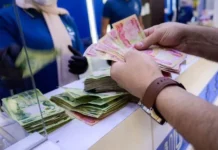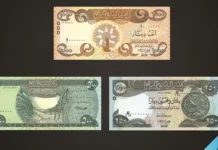Tishwash: A driver was arrested for attempting to smuggle counterfeit foreign currency through the Qaim border crossing.
The Border Ports Authority announced, on Saturday, the arrest of a driver who attempted to smuggle counterfeit foreign currency through the Al-Qaim port.
The authority said in a statement, “The Al-Qaim Border Port Directorate was able to apprehend an Iraqi driver while attempting to smuggle counterfeit foreign currency, in addition to 22 ancient coins, a number of foreign passports and SIM cards.”
The statement added, “The seizure operation was carried out in coordination and cooperation with the Customs Center and supporting departments at the port.”
It pointed out that “a formal seizure report was prepared, and the driver and the seized items were referred to the Al-Qaim Police Station to complete the necessary legal procedures.” link
Tishwash: Prime Minister’s Advisor: Iraq is experiencing its most stable period thanks to strong foreign reserves.
The Prime Minister’s advisor for financial affairs, Mazhar Mohammed Salih, issued a clarification on Sunday regarding Iraq’s internal and external debt.
While noting that domestic borrowing represents only 18 percent of the total precautionary debt, he confirmed the existence of committees working with international companies to convert a portion of the domestic debt into investment vehicles.
Saleh told the Iraqi News Agency (INA): “There is a blurry picture in interpreting the issue of external debt, as the external debts due until 2028 do not exceed $9 billion, which constitutes mostly half of the country’s total external debt,” indicating that “there are coordinated repayment mechanisms between the Ministry of Finance and the Central Bank, which are highly governed and transparent, and are settled accurately within a strict program and allocations in the federal general budget, and are periodically extinguished with the international creditor community.”
He added, “The total external debt does not exceed what was mentioned above, and the amounts mentioned in the Central Bank’s letter require explanation, as Iraq is not obligated to pay them, especially the $41 billion, as they are subject to the Paris Club agreement of 2004, which wrote off 80% or more of those debts related to the Iran-Iraq war, or what are called pre-1990 debts.”
He continued, “As for the domestic debt referred to in the Central Bank’s letter, it is the result of the accumulation of financial, security, financial and health crises that the Iraqi economy has been exposed to over the past decade and since the war on ISIS terrorism. This has been accompanied in recent years by severe geopolitical factors that have exposed global oil markets to a decline in prices due to the decline in growth in the global economy.”
He explained that “the borrowing undertaken by the current government as domestic debt constitutes only 18% of the total precautionary domestic debt included in the federal general budget (the three-year budget) pursuant to Law No. 13 of 2023 for the years 2023-2025.”
He stated that “the internal debt, which amounts to approximately 91 trillion dinars, is mostly held by the government banking system and under high-level financial and technical management,” noting that “there are specialized committees working in cooperation with international consulting companies to convert a large portion of that internal public debt into productive investment tools within a national fund to manage the aforementioned internal debt in a manner that aims to stimulate the real economy and transform debt obligations into investment opportunities in the real sector of the Iraqi economy.” He explained that “Iraq is currently experiencing the most stable period due to the strength of foreign reserves, the function of which is to stabilize the purchasing power of the Iraqi dinar and sustainable development.” link
*****************
Tishwash: Washington listens to Baghdad: Ambitious financial reforms seek credible implementation and institutional change.
This week, the Iraqi delegation participated in a banking reform conference held in Washington on the sidelines of the IMF and World Bank meetings. The event is a practical test of Baghdad’s ability to present a realistic picture of the results of its economic program.
The Iraqi delegation, which included a number of advisors and financial officials, sought to highlight the reform steps achieved over the past two years as indicators of the country’s transition from crisis management to building a modern economic system.
Advisor to the Prime Minister, Saleh Mahoud Salman, who presented Iraq’s paper at the conference, outlined a series of measures he described as “a pivotal stage in the path of economic and financial reform.” He explained that the government is “implementing a strategic banking reform package in cooperation with the Central Bank and international consulting firms,” focusing on “restructuring government banks, expanding financial inclusion, and automating the customs and tax system.”
However, this proposal, while important from an administrative perspective, raises broader questions about the depth of the transformation and its compatibility with the requirements of a rapidly evolving global economy.
Reform in a financial environment like Iraq’s, where structural challenges intertwine with political constraints, is not measured by the number of projects as much as it is by the state’s ability to change the behavior of the financial system itself.
Indicators of reform… but to what extent?
The government says the preparation of a three-year budget represents a qualitative shift in financial planning, an unprecedented step in the modern history of Iraq. However, financial economists point out that the success of this model depends on the availability of accurate data and stable monetary policy, two conditions that still face challenges in a financial environment that relies on oil revenues for more than 90% of the country’s GDP.
Institutional economists believe that “budget stability does not necessarily mean stable growth,” as volatility in oil prices and weak economic diversification make any long-term planning vulnerable to disruption in the event of a global crisis or a decline in demand for crude oil.
In contrast, the Prime Minister’s advisor points out that the government has been able to increase customs and tax revenues by automating the customs system using the UN-approved ASYCUDA program, which reflects the beginning of bridging the gap between the formal and parallel economies.
However, economic researchers believe that the success of this step requires an effective regulatory system and a flexible administrative structure, as technology alone is not sufficient to change work culture or reduce administrative corruption, which is one of the most prominent obstacles to financial reform in Iraq.
Financial inclusion and digital transformation: between ambition and capability
Electronic payment systems are one of the areas that have witnessed the most tangible progress, with financial inclusion rising from less than 10% to more than 40% in two years, according to the government advisor.
This digital leap is an indicator of a gradual shift in citizens’ financial behavior, especially with the expanding use of bank cards and mobile payment services.
However, banking observers believe that the quantitative expansion is not matched by qualitative developments in the banking structure. Banking services in most government banks remain traditional and rely on paper transactions, while the private sector suffers from restrictions in accessing external financing.
Digital economy experts point out that the transition to an e-economy cannot be complete without a comprehensive legal and legislative environment that ensures protection from financial crimes and builds trust between citizens and the banking system.
Some economists argue that Iraq, despite its relative progress in this area, is still in the “experimental” phase and needs to integrate technology into the public financial management system, not just into individual transactions.
Banking Sector Restructuring: Reform or Role Rotation?
Restructuring state-owned banks (Rafidain, Rashid, Industrial, and Agricultural) is a key pillar of the government’s plan. The government announces that it has increased the operational efficiency of these banks and begun reevaluating their assets. However, financial analysts believe that true reform cannot be achieved simply through administrative restructuring, but rather through the ability of these institutions to transform into sustainable financing entities that effectively contribute to driving local production.
Rafidain and Rashid, which represent approximately 80% of the banking market, still operate according to a traditional services model, while private banks face weak confidence from investors and depositors alike.
Banking finance experts point out that structural reform in the Iraqi banking sector requires gradual liberalization of credit policies and the activation of partnerships with regional banks, as a closed economy cannot benefit from global growth or external financing.
Poor institutional continuity and changing strategies
One of the most significant structural challenges facing economic reform in Iraq is the lack of institutional continuity. Each new government tends to reformulate the economic strategy from scratch, even in areas where tangible progress has been made.
This recurring pattern of “administrative rupture” hinders the accumulation of experience and leads to a loss of the institutional foundation necessary for any genuine reform process. Instead of building on previous programs and evaluating their results, plans are replaced by new projects presented under a different title, without any scientific review or analysis of previous policies.
Institutional economics researchers point out that this behavior reflects the weakness of the Iraqi state’s institutional structure, as there are no permanent planning bodies or economic councils to ensure the continuity of policies regardless of changes in government.
Thus, the reform process often becomes a short-term political project, tied to the government’s cycle rather than the economic cycle, limiting its ability to produce a sustainable economic impact or build internal and external confidence in fiscal policies.
Are these steps sufficient to keep pace with global transformations?
Iraq’s experience with financial and banking reform demonstrates that the problem has never been a lack of vision, but rather its frequent interruptions. Each government introduces new plans, discarding previous ones, as if the state is starting from scratch with each political cycle. This behavior reflects not only a contradiction in priorities, but also a weak institutional structure that lacks a continuous economic memory capable of transferring experience and embedding successful policies.
Public economics studies confirm that the success of any financial reform depends more on accumulated experience and continuity than on the amount of funding or international support. In the Iraqi case, reforms are still managed according to the logic of the “governmental phase” rather than the “national phase,” which makes them vulnerable to disruption as soon as the political orientation shifts.
The steps presented at the Washington conference reflect a clear technical effort, but they will not translate into actual achievement unless they are linked to independent institutions capable of protecting reform from political change. Reform is not achieved by changing plans, but rather by establishing an implementation mechanism that is not affected by changes in ministers or governments.
Thus, it can be said that financial reform in Iraq is moving in the right direction in terms of form, but it still requires a permanent institutional framework that ensures sustainability and transforms reform from a government initiative into a state-led process that remains unchanged by changes in leadership. link





